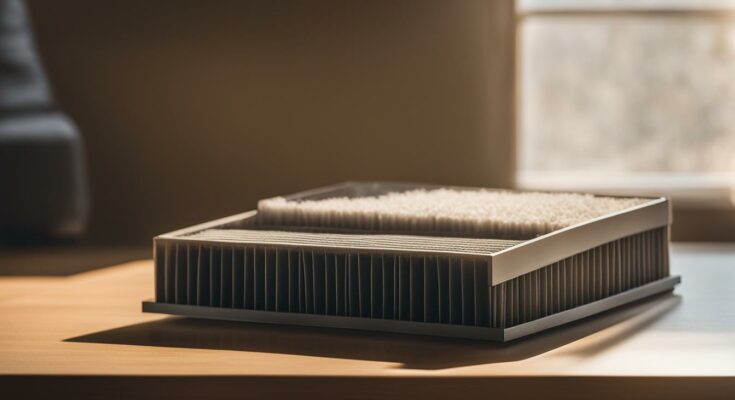Maintaining a healthy living environment involves more than just cleaning surfaces and decluttering your space. One vital aspect of home maintenance that often goes overlooked is air filter replacement. Your HVAC system’s air filter plays a critical role in filtering out dust, allergens, and other pollutants from the air you breathe.
Knowing when to replace your air filter is crucial for keeping your home’s indoor air quality clean and healthy. In this section, we’ll provide you with essential tips on air filter replacement, including how often to change your air filter, and what benefits it provides to you and your family.
Key Takeaways
- Regular air filter replacement is essential for maintaining good indoor air quality.
- Knowing when to replace your air filter improves the efficiency of your HVAC system.
- Replacing your air filter can reduce allergy and asthma symptoms caused by indoor air pollutants.
- Following our air filter replacement guide can help you save money on maintenance costs.
- DIY air filter replacement is a simple, yet effective task that can be done quickly and easily.
Signs to Replace Air Filter
Regular air filter replacement is key to maintaining healthy air quality and optimal HVAC performance. Knowing the signs that indicate it’s time to change your air filter will help you avoid potential health hazards and costly repairs. Here are the most common signs to look out for:
- Increased Energy Bills: A dirty air filter can cause your HVAC system to work harder than necessary, resulting in higher energy bills.
- Reduced Airflow: Over time, a clogged air filter can reduce the airflow from your HVAC system, resulting in uneven heating and cooling throughout your home.
- Strange Odors: An old or dirty air filter can produce unpleasant smells and impact the overall air quality in your home.
- Inaccurate Thermostat: A dirty air filter can throw off the temperature of your home, making your thermostat less accurate.
By keeping an eye out for these signs, you can determine the best time to change your air filter and reap the benefits of a cleaner and healthier living environment. Now that you know the signs, let’s take a closer look at the benefits of replacing your air filter.
Benefits of Replacing Air Filter
Regular air filter replacement provides a range of benefits for your home and HVAC system. These benefits include:
| Benefit | Description |
|---|---|
| Improved Air Quality | A clean air filter helps remove pollutants and allergens from the air, promoting better indoor air quality and reducing allergies and other respiratory issues. |
| Enhanced HVAC Performance | A clean air filter allows for proper airflow, reducing strain on your HVAC system and improving its overall performance. |
| Cost Savings | Regular air filter replacement can help reduce energy bills and avoid costly repairs or replacements of your HVAC system. |
By replacing your air filter regularly, you can enjoy these benefits and ensure the optimal performance of your HVAC system. But how often should you change your air filter?
Best Time to Change Air Filter
The frequency of air filter replacement depends on several factors, including the number of occupants in your home, whether you have pets or suffer from allergies, and the level of air pollution in your area. As a general rule, it’s recommended to replace your air filter every 30-60 days.
However, it’s important to check your air filter regularly and change it as needed based on the signs discussed earlier. By prioritizing regular air filter replacement, you can enjoy cleaner air, improved HVAC performance, and cost savings in the long run.
Air Filter Maintenance Tips
If you want to keep your home’s air clean and your HVAC system running efficiently, regular air filter replacement is a must. Here are some air filter maintenance tips that will help you keep your filter in good condition:
| Step | Description |
|---|---|
| Step 1 | Check your air filter once a month. If it looks dirty, it’s time to replace it. |
| Step 2 | Turn off your HVAC system before removing the old filter. |
| Step 3 | Choose the right size and type of air filter for your HVAC system. Follow manufacturer recommendations for best results. |
| Step 4 | Insert the new filter, following the arrows on the filter that indicate the direction of airflow. |
| Step 5 | Turn on your HVAC system and enjoy cleaner air! |
By following these simple steps, you can ensure that your home’s air filter is always in good condition, helping to improve air quality and HVAC efficiency. Make a note on your calendar to remind yourself to check your air filter regularly and replace it as needed.
Importance of Regular Air Filter Replacement
Regular air filter replacement is a crucial aspect of maintaining a healthy home environment. Neglecting this task can lead to a range of issues, including poor indoor air quality, increased energy bills, and even HVAC system damage.
When your air filter becomes clogged with dirt, dust, and other debris, it can no longer effectively capture these particles, allowing them to circulate throughout your home. This can be especially harmful to those with allergies or respiratory issues, as it can exacerbate symptoms and lead to more serious health concerns.
Additionally, a dirty air filter can cause your HVAC system to work harder than necessary, resulting in increased energy consumption and higher utility bills. Over time, this added strain can also lead to premature system failure, resulting in costly repairs or replacement.
When to Replace Your Air Filter
So, how often should you replace your air filter? The answer can vary depending on several factors, such as the type of filter you have, how often you use your HVAC system, and whether you have pets or live in a particularly dusty or polluted area.
As a general rule of thumb, it’s recommended to replace your air filter every 1-3 months. However, it’s important to check the filter regularly and replace it as needed, rather than simply relying on a set schedule.
The Benefits of Regular Air Filter Replacement
Replacing your air filter on a regular basis offers several benefits, including:
- Improved indoor air quality
- Better HVAC system efficiency and performance
- Lower energy bills
- Reduced risk of system failure or damage
By prioritizing this simple yet essential maintenance task, you can enjoy a cleaner, healthier, and more comfortable living space while also protecting your HVAC system investment.
DIY Air Filter Replacement Guide
Regular air filter replacement is crucial for maintaining clean indoor air and optimal HVAC performance. In this section, we will provide you with a step-by-step guide on how to replace your air filter yourself. This DIY approach will not only save you money but also ensure that you know exactly how often to change your air filter and maintain a healthy living environment.
Step 1: Determine the Filter Size and Type
The first step is to determine the size and type of air filter you need. Check the existing filter for size information or consult your HVAC system manual. You should also note whether your system uses a flat or pleated filter.
Step 2: Purchase a Replacement Filter
Once you know the size and type of filter you need, purchase a replacement filter from a hardware or home improvement store. Make sure to choose a high-quality filter that meets the specifications of your HVAC system.
Step 3: Turn Off the HVAC System
Before replacing your air filter, turn off your HVAC system to prevent any debris or dust from circulating in the air.
Step 4: Remove the Old Filter
Locate the air filter in your HVAC system and remove the old filter carefully. Pay attention to how the filter is positioned so that you can install the new filter correctly.
Step 5: Install the New Filter
Insert the new filter into your HVAC system, making sure that it is positioned correctly and securely. If you have a flat filter, ensure the arrows on the filter match the direction of the airflow. If you have a pleated filter, ensure the folds face away from the airflow.
Step 6: Turn On the HVAC System
Once the new filter is installed, turn on your HVAC system and check that it is functioning correctly. It’s recommended to replace your air filter every 1-3 months depending on the type of filter and the level of air pollution in your home. By regularly changing your air filter, you’ll enhance your indoor air quality and improve the lifespan of your HVAC system.
Improve Indoor Air Quality with Regular Air Filter Replacement
Regular air filter replacement is key to maintaining a healthy living environment. By replacing your air filter, you can improve your indoor air quality and reap a range of benefits that contribute to better health and comfort.
The Benefits of Replacing Your Air Filter
Replacing your air filter can have a significant impact on your home’s air quality. Here are some of the benefits you can expect:
- Cleaner air: Over time, air filters become clogged with dirt, dust, and other particles, reducing their effectiveness in removing these pollutants from your indoor air. By regularly replacing your air filter, you can ensure that the air circulating in your home is cleaner and healthier to breathe.
- Energy savings: When air filters are clogged, your HVAC system has to work harder to circulate air throughout your home. This can lead to increased energy consumption and higher utility bills. By replacing your air filter regularly, you can improve HVAC efficiency and save money on your energy bills.
- Extended HVAC lifespan: A clogged air filter can put strain on your HVAC system, leading to wear and tear over time. By replacing your air filter regularly, you can help extend the lifespan of your HVAC system and avoid costly repairs or replacements down the line.
When to Replace Your Air Filter
Knowing when to replace your air filter is essential for maintaining optimal indoor air quality. Here are some general guidelines:
- Replace your air filter every 1-3 months, depending on the type of filter and your home’s unique air quality needs.
- Check your air filter regularly for signs of wear and tear, such as visible dirt or damage to the filter material.
- If you have pets or live in an area with high levels of air pollution or pollen, you may need to replace your air filter more frequently.
Conclusion
Regular air filter replacement is a simple yet effective way to improve your indoor air quality and enjoy a range of benefits, from cleaner air to energy savings and extended HVAC lifespan. By following the guidelines above and replacing your air filter as needed, you can ensure a healthier, more comfortable living environment.
Conclusion
Regular air filter replacement is essential for maintaining a healthy and comfortable home environment. By following the guidelines outlined in this air filter replacement guide, you can enjoy several benefits such as improved air quality, better HVAC system efficiency, and lower energy bills.
Don’t wait for your air filter to show signs of wear and tear. Replace it every 90 days or as recommended by your HVAC system manufacturer. Remember, neglecting air filter replacement can lead to poor air quality, allergies, asthma, and other respiratory problems.
So, take charge of your home’s indoor air quality and make air filter replacement a priority. With simple DIY steps, you can save money and breathe cleaner air every day.
FAQ
When should I replace my air filter?
It is recommended to replace your air filter every 1-3 months, depending on factors such as the type of filter, level of indoor pollution, and usage of your HVAC system.
What are the signs that indicate I need to replace my air filter?
Some common signs include reduced airflow, dirty or dusty air coming out of vents, increased allergy symptoms, and a noticeable decline in HVAC system performance.
How do I maintain my air filter?
To maintain your air filter, you should regularly inspect it for dirt and debris, clean or replace it as needed, and follow the manufacturer’s guidelines for proper maintenance.
Why is air filter replacement important?
Regular air filter replacement is vital for maintaining good indoor air quality, preventing dust and allergens from circulating in your home, and optimizing the efficiency and lifespan of your HVAC system.
Can I replace my air filter myself?
Yes, air filter replacement is a simple DIY task. Just make sure you purchase the correct filter size, follow the manufacturer’s instructions, and take necessary safety precautions.
How does regular air filter replacement improve indoor air quality?
By regularly replacing your air filter, you remove dust, pollen, mold spores, pet dander, and other airborne particles, resulting in cleaner and healthier indoor air for you and your family.




